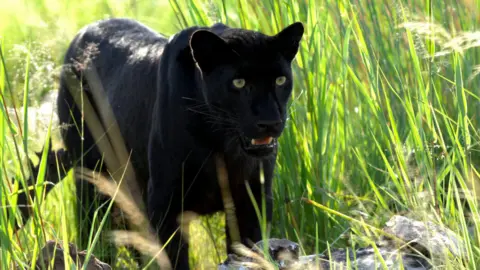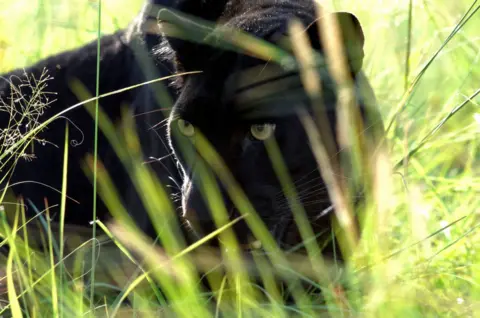Big cat sightings could be leopards, claims expert
 BBC
BBCReported sightings of a panther or puma in Wiltshire in the last few months could well be genuine, according to a big cat expert.
Gloucestershire-based Rick Minter, host of the Big Cat Conversations podcast, believes a reported sighting near Melksham could well be a black leopard indigenous to the Malay Peninsula.
Speaking to BBC Wiltshire, Mr Minter said people frequently described seeing a cat with a thick, tube-like tail, a boxy head and, long, muscular body slightly larger than a labrador.
Mr Minter, whose podcast examines sightings of big cats around the UK, thinks the UK may have a well-established population of leopards breeding in the wild.
Black leopards are biologically the same as normal spotted leopards, but due to a recessive gene the black pigment dominates.
Mr Minter, who previously worked for a government conservation agency, believes that the UK's population may now exceed 300, with some of their ancestors being dumped as early as the Second World War due to meat rationing.
Changes to laws around keeping wild animals in the 1970s also resulted in another wave of big cats being illegally released, he said.

"(The leopards) seem to have a genetic diversity because they are described as fit and healthy and confident which they wouldn't be if they were straight out of a zoo or recently released," Mr Minter said.
"I think they've got this genetic breadth in them because they were dumped and released at different places and different times."
Big cats probably prey on rabbits and deer, Mr Minter said, and are unlikely to pose a threat to humans unless startled when "hunkering down" in a confined space such as a barn or a shed.
"But even then we've had people report that they've raced past them to the door to get out," he said.
Illegal release of major predators, or "rogue rewilding" is of serious concern to conservationists and land owners.
Four lynxes illegally released in the Scottish Highlands were captured near Kingussie in recent days.
One has since died.
The Royal Zoological Society of Scotland blamed the death on the stress caused by the lynx being abandoned in a new and "extremely harsh" environment.
Follow BBC Wiltshire on Facebook, X and Instagram. Send your story ideas to us on email or via WhatsApp on 0800 313 4630.
